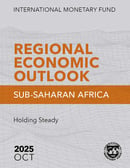This web page provides information in on the activities of the Office, views of the IMF staff, and the relations between Tanzania and the IMF. Additional information can be found on Tanzania and IMF country page, including official IMF reports and Executive Board documents that deal with Tanzania.
At a Glance
- Current IMF membership: 191 countries
- Tanzania Joined the Fund on September 10, 1962.
- Total Quotas: SDR 397.8 Million
- Outstanding Purchases and Loans: SDR 41.11 (As of June 30, 2019)
- Article IV / Country Report: April 28, 2023 (IMF Country Report No. 23/153)
Tanzania and the IMF
No results found. Either there was an error with the web service or there is no data returned by the web service.
Regional Economic Outlook for Sub-Saharan Africa
October 16, 2025

The outlook for Sub-Saharan Africa is showing resilience, despite a challenging external environment with uneven prospects in commodity prices, still tight borrowing conditions, and a deterioration of the global trade and aid landscape.
Read the Report
Fraudulent Scam Emails Using the Name of the IMF
For more information please see Fraudulent Scam Emails Using the Name of the IMF
Departmental Papers on Africa
 The Departmental African Paper Series covers research on sub-Saharan Africa conducted by International Monetary Fund (IMF) staff, particularly on issues of broad regional or cross-country interest. The views expressed in these papers are those of the author(s) and do not necessarily represent the views of the IMF, its Executive Board, or IMF Management.
The Departmental African Paper Series covers research on sub-Saharan Africa conducted by International Monetary Fund (IMF) staff, particularly on issues of broad regional or cross-country interest. The views expressed in these papers are those of the author(s) and do not necessarily represent the views of the IMF, its Executive Board, or IMF Management.



